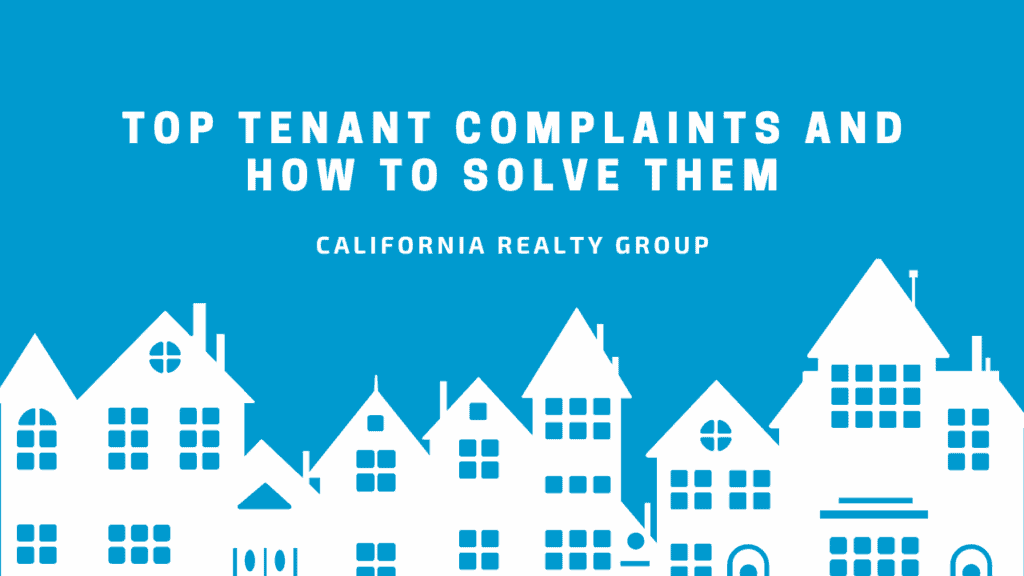Top Tenant Complaints and How to Solve Them
Key Takeaways
- Great communication and timely maintenance go a long way in keeping tenants happy and lease renewals coming.
- Clear systems—for repairs, noise rules, and shared spaces—can help prevent small issues from becoming bigger concerns.
- Being upfront about rent increases and respecting tenants’ privacy builds trust and long-term loyalty.
- A professional property management team like California Realty Group can help handle tenant concerns smoothly, so you can focus on growing your investment.
At California Realty Group, we understand that keeping tenants satisfied is one of the most effective ways to reduce turnover and maintain consistent income. When concerns are left unaddressed, even small issues can snowball into bigger problems, leading to dissatisfaction, late rent payments, negative reviews, and eventually, vacancies.
By understanding the most common tenant complaints and knowing how to respond to them promptly and professionally, you can build trust, improve tenant retention, and protect the long-term success of your rental business.
Maintenance Delays
One of the most common and frustrating complaints tenants have is slow or neglected maintenance. Whether it’s a leaking faucet, a broken heater in winter, or a malfunctioning stove, any repair delay can feel like a lack of concern for their comfort.
The solution is a clear and efficient maintenance process. Set up an easy system for tenants to report issues, and respond promptly—even if it’s just to acknowledge the request and provide a timeline. Preventive maintenance is also important. Regular inspections and seasonal upkeep can help you catch issues before they become major inconveniences.
If you own several properties or live out of the area, having a property manager on call can be a great way to keep things running smoothly. Tenants appreciate knowing that any issues will be addressed quickly and with care, which helps build trust and satisfaction.
Poor Communication
Tenants often complain about a lack of communication or unclear expectations. This might include unanswered emails, confusing lease clauses, or not being informed about upcoming maintenance or inspections.
To resolve this, keep communication proactive and clear. Use email or a property management portal to send reminders about rent due dates, lease renewals, scheduled maintenance, or any policy changes. Make yourself available during reasonable hours, and respond to messages within a set timeframe.
Creating a welcome guide for new tenants can also help clarify expectations from the start, such as how to request repairs, pay rent, or contact you in emergencies. Transparent communication builds trust and minimizes misunderstandings.
Noise Issues
Noise complaints, whether caused by neighbors within the building or external sources like street traffic or nearby construction, can create long-term frustration. This is particularly true in multi-family units or shared properties where sound can easily travel between walls, floors, and ceilings.
You may not be able to control every source of noise, but you can take steps to reduce it. Start by ensuring your rental unit is properly insulated, including sealing windows and using thicker carpeting or rugs to absorb sound. In shared properties, include clear quiet hours in the rental agreement.
If the issue stems from another tenant, address it diplomatically. Speak with the responsible party, document any communications, and offer solutions such as noise machines, carpets, or minor behavior adjustments. Encouraging mutual respect between tenants can ease tensions without escalating conflict.
Pest Infestations
No tenant wants to deal with pests—whether it’s ants in the kitchen, cockroaches in the bathroom, or mice in the walls. Pest infestations are among the most serious complaints because they can affect health, safety, and quality of life.
To address this, prevention is your first line of defense. Keep the property clean, ensure garbage is removed regularly, and close off entry points like gaps in windows or baseboards. If an infestation occurs, act immediately. Hire licensed pest control professionals and inform your tenants of the steps being taken.
Regular pest inspections and seasonal treatments can also help keep infestations from returning. Show tenants that you prioritize their comfort and well-being by handling pest issues thoroughly and promptly.
Security Concerns
Feeling unsafe in a rental property can be a dealbreaker for many tenants. Common concerns include broken locks, poor exterior lighting, unsecured entrances, or a lack of security cameras. Safety is not just a tenant expectation—it’s your responsibility.
Check that all exterior doors and windows have functioning locks. Install bright, motion-sensor lights outside entryways and in parking areas. In larger buildings, consider adding security systems, surveillance cameras, or secure mailboxes.
Also, consider responding quickly to reports of suspicious activity and collaborating with neighbors or local police when needed. Feeling safe at home is non-negotiable, and a secure environment contributes significantly to long-term tenant satisfaction.
Lack of Privacy
Tenants expect their home to be a private space. One major complaint from tenants is unannounced entry by landlords or maintenance personnel. Even if it’s for valid reasons, entering without notice violates their privacy rights and can damage your relationship.
To solve this, always follow the required legal notice period before entering a unit—typically 24 to 48 hours, depending on your local landlord-tenant laws. Respect the tenant’s schedule and communicate the purpose of entry in advance.
Avoid unnecessary visits and combine minor inspections with scheduled maintenance whenever possible. When tenants feel that their space is respected, they are more likely to stay long-term and recommend your property to others.
Rent Increases Without Justification
Rent increases are part of owning rental property, especially in growing markets. However, tenants often complain about sudden or steep rent hikes, especially if they feel the condition of the unit or the quality of service doesn’t match the new price.
To avoid complaints, be transparent and fair. Give plenty of advance notice and clearly explain the reason for the increase. If you’ve made improvements to the unit or added amenities, highlight them. Benchmark your pricing against comparable properties in the area to ensure you’re not pricing yourself out of the market.
Many tenants are willing to accept small annual increases when they’re accompanied by good communication and visible value.
Shared Space Cleanliness
In properties with shared spaces—like hallways, laundry rooms, parking lots, or yards—tenants often report dissatisfaction with cleanliness and upkeep. Hiring a regular cleaning service and having clear expectations for common area use can help.
Post rules for shared areas, and enforce them evenly. You can also schedule periodic inspections to catch issues early. If tenants are responsible for certain areas, like taking out trash or yard maintenance in a duplex, include those expectations clearly in the lease agreement.
Parking Problems
Another common tenant complaint is the lack of parking space or issues with assigned parking spots. If your property has limited parking, this can lead to disputes among tenants or between tenants and their guests.
Make parking rules clear from the beginning. Assign parking spaces when possible and enforce rules fairly. If space is limited, consider staggered parking options or agreements for guest parking. In some cases, renting nearby off-site parking can also be a practical solution. Being proactive about parking policies can help reduce tenant frustration and ensure smoother operations overall.
When to Hire a Property Management Company
Handling tenant complaints takes time, patience, and a proactive mindset. For property owners managing multiple units or working full-time jobs, staying on top of all tenant concerns can be challenging. This is where hiring a professional property management company like California Realty Group can make a big difference.
A good property manager acts as the point of contact for your tenants. They handle maintenance requests, enforce lease terms, communicate with tenants, and mediate conflicts—saving you time and reducing stress. They also help ensure your rental is legally compliant and properly maintained, which can prevent many common complaints in the first place.
Most importantly, property managers help you maintain a professional, consistent standard of service. Tenants are more likely to renew their lease when they feel heard, respected, and cared for—and that’s exactly what a good property management team can deliver.
Let’s Talk About Managing Your Property
Final Thoughts
Tenant complaints are a normal part of owning rental property, but how you respond to them makes all the difference. Ignoring small issues can result in bigger problems later, including vacancies, lost income, and negative reviews. By being proactive, communicative, and respectful of your tenants’ needs, you can foster a strong landlord-tenant relationship built on trust.
Addressing complaints quickly and efficiently is the key to long-term success. If you need help, work with a professional property management company like the California Realty Group.






